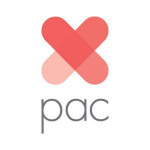Mark Grantham has a zest for life now. The retired English and history teacher, 62, who lives in Chattanooga, Tennessee, and was diagnosed with HIV in the mid-1980s, still works as a substitute teacher “for the passion and love of education,” he says. He has a 9-year-old dachshund-beagle mix, Sir Rufus, that he calls “a wonderful companion, full of energy and comical, and he still acts like a puppy.” And he loves knitting, reading, listening to opera, cooking and, in his words, “advocating for both long-term survivors of HIV as well as those with HIV living in rural areas.”

Courtesy of Mark Grantham
But his spirits weren’t always so good. For years, he says, the feeling that having HIV made him dirty and untouchable compounded a lifelong baseline of low self-esteem and made him feel, in his own words, “like a toxic waste dump.” He adds, “I had been made to feel less-than, untouchable and off-limits. Sadly, a lot of the LGBTQ community reinforced this feeling. Also, here in the Deep South, where faith and religion are a big part of one’s life, many houses of worship shunned and ousted individuals living with HIV. For much of my life, I’ve dealt with a negative self-image. I felt I was never handsome enough, tall enough, cool enough.”
This depression dates back partly to his mid-1980s HIV diagnosis, when “I was told that I had maybe two or three years to live and to get my affairs in order. So I dropped out of school, quit my job, cashed in my 401(k) and waited to die—all of which reinforced the feeling that I was dirty, undesirable and tainted. For 15 or so years, I wallowed in self-pity.”
Thankfully, he was a part of local and national networks of people living with HIV, which kept him afloat. And indeed, with the advent of effective HIV therapy in the late ’90s, he realized he likely had far more than two or three years ahead of him. In 2006 and 2007, “a little dissatisfied” with the Florida school system he’d been teaching in, he even wound up teaching English in pre-conflict Syria (in Damascus and Homs), traveling to nearby Beirut for his HIV meds.
But the sense of being damaged goods because of his HIV persisted. “I was afraid to get close to anyone because I feared I would be the cause of their death. Instead, I became a fan of anonymous sex.”
But then, in 2016, while at a meeting of the Tennessee Association of People with AIDS (TAPWA) he heard a Nashville friend, Brady Morris, speak about Undetectable Equals Untransmittable (U=U)—the fact that people with HIV on meds who have an undetectable viral load are unable to transmit the virus via sex.
“The proverbial light bulb went on,” Grantham says of that moment. “It totally changed my perception of myself and my life.” Since then, he says, “my quality of life has done a 180. I began to realize that human touch, intimacy and sex were not only natural but needed in my life.” His partner, Butch, who died in 2015 from a burst pancreas, also had HIV.
Things really changed for Grantham after 2016, he says, remembering being at the U.S. Conference on AIDS when members of the Prevention Access Campaign, the nonprofit that launched U=U, took over the stage to the tune of the song “Celebrate” to bring attention to the U=U message. “This brought tears to my eyes,” he recalls. “It was an earth-shattering event—one that said to the world, ‘We are here, and we deserve to be loved.’”
Still, he hasn’t allowed himself to embark on a relationship. “It would be great to fall in love again and have a committed relationship, so let’s knock on wood, cross our fingers and more,” he says.
But, he points out, “since the increased public awareness of U=U, I’ve allowed my quality of life to blossom.” He has tutored refugees in English, mentored high school seniors, volunteered at various HIV peer programs and become more involved with the Chattanooga Quaker community. He spends his mornings meditating, then works in his vegetable garden, researches Middle Eastern recipes and knits caps for people with cancer undergoing chemo, premature babies and people experiencing homelessness.
He’s saving money to visit England, where his cousin lives. “I’d like to take a side trip to Scotland to visit some places where they shear sheep and turn the wool into yarn as well as to see the town my mother’s family is from,” he says. He would also like to join a chorale and teach knitting.
And to think that he owes so much of this newfound energy to his learning about U=U. “More of our information gatekeepers at AIDS organizations, hospitals and clinics have to be more receptive to this important message,” he says. “It’s unbelievable that there are still medical case managers who don’t believe the science behind it. U=U literally gave me my life back.”
In many ways, Deirdre Johnson is the face of living out loud and proud with HIV. The 47-year-old Virginian who was diagnosed with HIV in 2000 has her own HIV awareness speaking business, Deirdre Speaks and is on staff at The Sero Project, which works to repeal or at least modernize the antiquated laws still on the books in several states that criminalize people with HIV for having sex without disclosing their status—even if they’re undetectable, use condoms and/or don’t engage in high-risk sex acts. She got the Sero job partly because she played a key role in getting such a law modernized in her own state in 2021, after years of effort.

Deirdre JohnsonCourtesy of Deirdre Johnson
But as is the case for many folks living with HIV, the road to feeling OK about being positive has been a journey—one she’s still on—that has been aided by the past decade’s confirmation and dissemination of U=U. It’s a fact she had suspected ever since she found out she was positive while pregnant with her second child and was told that as long as she was on HIV meds with her virus fully suppressed, the chance of passing HIV to her baby while delivering was virtually zero.
Despite that news, says Johnson, she insisted on a C-section, which provides another layer of protection. When her doctor told her it was unnecessary, “I said to him, ‘If this were your child, what level of risk would you prefer?’” she recounts. “And that’s when he signed off on my C-section.”
Given her pregnancy experience, then, she already imagined that being undetectable might mean being unable to transmit HIV sexually. But she didn’t know it for sure, and she was deeply uncomfortable dating. “Being intimate was very traumatic for me,” she says, laughingly adding that, when she decided she wasn’t into a guy, “I would disclose my status as a way to get rid of them.”
Until, that is, one came along she really liked. “In our first encounter,” she recalls, “he had to calm me down, even though we were using condoms.” That’s how worried she was she might transmit HIV to him. (Even though, we should add, the chances of a woman passing HIV to a man via vaginal intercourse are extremely low, even if the woman is not undetectable.)
And even though studies confirming U=U emerged in the early 2010s, her U=U aha moment didn’t really occur until 2018, says Johnson, when she met Davina Conner (aka Pozitively Dee), a prominent voice for Black women and U=U since 2016 and the executive director of Poz Haven Foundation Inc. in Las Vegas. Conner introduced Johnson to Bruce Richman, who launched the Prevention Access Campaign precisely to spread the news of U=U and persuade global, national and local health entities to sign on to it. By now, virtually all of them have, including the World Health Organization and the Centers for Disease Control and Prevention.
Of that moment, Johnson says, “I thought, Wow—there’s an actual phrase, U=U, to go with what I’ve half-believed for 20 years. That message is amazing for people like me. We think, Wow—now I can possibly have condomless sex, including if you want to try to get pregnant.” In fact, she says, after she delivered her second child HIV-free, doctors and family members persuaded her to have a tubal ligation—having one’s Fallopian tubes tied, cut or blocked—to prevent further pregnancy.
“If I had known about U=U then, I wouldn’t have done it,” she says, “because I actually wanted as many kids as Josephine Baker.”
But Johnson is also proof that knowing something rationally is not the same as embracing it wholly within. She currently has an HIV-negative sex partner with whom she has condomless sex, but she says she’s still working to relax fully into the idea that she is 100% unable to pass HIV on to him. It’s part of her broader journey to, as she puts it, “come into my sexiness and confidence in being naked and both giving and getting pleasure.” She highly recommends the workshops and videos of sex educator Goody Howard.
She adds, “There’s nothing anyone can say or do [to make you fully absorb the reality of U=U]—it has to click with you.” She believes that U=U is a conversation prompt, not a mandate. “There are people who,” for various reasons, including mental illness, homelessness and substance use, “can’t or won’t get to undetectable,” she says, “and they shouldn’t be judged or shamed for it.”
But as for her, she has become an ambassador for the U=U message. “It’s not as widely known in the straight world as it is in the gay one,” she says. But occasionally, she’s pleasantly surprised. Recently, she got in an Uber and, while chatting with the driver, told him she was an HIV educator and activist. “He said, ‘Hey, I’ve heard about this U=U thing...’ And I’m sitting there, like, I don’t have to do any education today.”







Comments
Comments